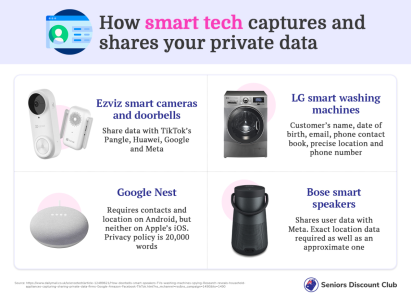Are your everyday tech devices secretly 'spying' on you?
- Replies 10
Do you ever feel like you're being watched in your own home?
As creepy as it sounds, t you probably are.
Anywhere you look, today's tech gadgets are being advertised as 'essentials' that will make your life easier and more convenient. And apparently, that's what most people want.
Smart speakers, doorbell cameras, TVs, and even washing machines—these popular, everyday devices are more than just helpful, time-saving appliances. Recent research has uncovered that they're also being used to spy on us.
These 'standard' amenities are actually capturing and sharing our private information with familiar tech giants such as Google, Amazon, Facebook and TikTok, if recent reports are to be believed.
Everyday devices such as smart speakers, doorbell cameras, TVs and washing machines are reportedly capturing and sharing private information with big tech firms. Credit: Shutterstock.
Evidence suggests that these companies and their business partners are using this data to target people with personalised, highly relevant advertising on our smartphones and other device screens.
What's even worse is that the companies behind all this data collection appear to be gathering far more information than is necessary to run their products.
To start with, security experts discovered that when an Android device is used to connect to Google Nest smart home products (like speakers, cameras and heating systems), a lot more user location data is transmitted than when an Apple device is used.
Consumer website Which? uncovered another concerning trend—that most companies have spy and tracking functions switched on by default.
Bose smart speakers were shown to be sharing user data with Meta, the parent company of Facebook. And in perhaps the most startling—and sneaky—find, Ezviz smart cameras and doorbells, sold widely by Argos and other major retailers, had the most active tracking software of all the brands tested.
The list of companies with access to users' data included TikTok's business marketing unit, Pangle (a video advertising platform), Huawei, Google, Meta and Amazon.
It just goes to show that despite your efforts to keep your information safe, you might have been given them all up already.
But as creepy and intrusive as the findings are, all is not lost.
Fortunately, there are certain things we can do to protect ourselves from unwanted 'invasion of privacy', with most manufacturers giving consumers the option to opt out of the spy and tracking functionality.
All that's required is to change the settings on the product or app. However, there is a chance that certain functions of the device or app will no longer work if you do this.
As far as smart TVs go, menus are usually filled with adverts—some of which are personalised based on the data the device has collected. While tracking is optional, Which? found that LG, Samsung and Sony bundle this up into an 'accept all' button.
LG appliances also required the most data from users to swap an account, asking for name, date of birth, email, phone contact book, precise location and phone number.
Meanwhile, Hoover wanted consumers' contacts and phone numbers on Android devices, and with Miele, tracking of precise location is enabled by default and required to use the app.
Just what kinds of data are people concerned about being out there in the world?
According to a survey by Which?, most of us are worried about our contacts and background location being shared, followed by photos, phone numbers and precise locations.
Under General Data Protection Regulations (GDPR), companies must be honest about what kind of data is being taken, and how it's being processed.
All information gathered must be relevant and limited to what's necessary for the job at hand, and while companies often claim 'legitimate interests', the reasons given are often too broad for us to truly grasp what is going on.
Which? Policy Director Rocio Concha offers this advice: 'Firms should not collect more data than they need to provide the service that's on offer, particularly if they are going to bury this important information in lengthy terms and conditions.’
It's up to the Information Commissioner's Office to update guidelines to better protect consumers from accidentally giving up huge swatches of their personal individual data without realising.

While it's not exactly a 'secret' that companies gather user data to enhance customer experiences, this doesn't mean that the average homeowner shouldn't be cautious.
Members, what are your thoughts on these revelations? Let us know in the comments.
As creepy as it sounds, t you probably are.
Anywhere you look, today's tech gadgets are being advertised as 'essentials' that will make your life easier and more convenient. And apparently, that's what most people want.
Smart speakers, doorbell cameras, TVs, and even washing machines—these popular, everyday devices are more than just helpful, time-saving appliances. Recent research has uncovered that they're also being used to spy on us.
These 'standard' amenities are actually capturing and sharing our private information with familiar tech giants such as Google, Amazon, Facebook and TikTok, if recent reports are to be believed.
Everyday devices such as smart speakers, doorbell cameras, TVs and washing machines are reportedly capturing and sharing private information with big tech firms. Credit: Shutterstock.
Evidence suggests that these companies and their business partners are using this data to target people with personalised, highly relevant advertising on our smartphones and other device screens.
What's even worse is that the companies behind all this data collection appear to be gathering far more information than is necessary to run their products.
To start with, security experts discovered that when an Android device is used to connect to Google Nest smart home products (like speakers, cameras and heating systems), a lot more user location data is transmitted than when an Apple device is used.
Consumer website Which? uncovered another concerning trend—that most companies have spy and tracking functions switched on by default.
Bose smart speakers were shown to be sharing user data with Meta, the parent company of Facebook. And in perhaps the most startling—and sneaky—find, Ezviz smart cameras and doorbells, sold widely by Argos and other major retailers, had the most active tracking software of all the brands tested.
The list of companies with access to users' data included TikTok's business marketing unit, Pangle (a video advertising platform), Huawei, Google, Meta and Amazon.
It just goes to show that despite your efforts to keep your information safe, you might have been given them all up already.
But as creepy and intrusive as the findings are, all is not lost.
Fortunately, there are certain things we can do to protect ourselves from unwanted 'invasion of privacy', with most manufacturers giving consumers the option to opt out of the spy and tracking functionality.
All that's required is to change the settings on the product or app. However, there is a chance that certain functions of the device or app will no longer work if you do this.
As far as smart TVs go, menus are usually filled with adverts—some of which are personalised based on the data the device has collected. While tracking is optional, Which? found that LG, Samsung and Sony bundle this up into an 'accept all' button.
LG appliances also required the most data from users to swap an account, asking for name, date of birth, email, phone contact book, precise location and phone number.
Meanwhile, Hoover wanted consumers' contacts and phone numbers on Android devices, and with Miele, tracking of precise location is enabled by default and required to use the app.
Just what kinds of data are people concerned about being out there in the world?
According to a survey by Which?, most of us are worried about our contacts and background location being shared, followed by photos, phone numbers and precise locations.
Under General Data Protection Regulations (GDPR), companies must be honest about what kind of data is being taken, and how it's being processed.
All information gathered must be relevant and limited to what's necessary for the job at hand, and while companies often claim 'legitimate interests', the reasons given are often too broad for us to truly grasp what is going on.
Which? Policy Director Rocio Concha offers this advice: 'Firms should not collect more data than they need to provide the service that's on offer, particularly if they are going to bury this important information in lengthy terms and conditions.’
It's up to the Information Commissioner's Office to update guidelines to better protect consumers from accidentally giving up huge swatches of their personal individual data without realising.
Key Takeaways
- Everyday devices such as smart speakers, doorbell cameras, TVs and washing machines are reportedly capturing and sharing private information with big tech firms such as Google, Amazon, Facebook and TikTok.
- The research by Which? revealed that these companies seem to be gathering more data than is necessary for the device to function.
- The smart devices share the gathered information with marketing firms, which then target individuals with advertisements on smartphones and other devices.
- Smart TVs, smart cameras and doorbells all contain tracking functions that are automatically activated by default.
While it's not exactly a 'secret' that companies gather user data to enhance customer experiences, this doesn't mean that the average homeowner shouldn't be cautious.
Members, what are your thoughts on these revelations? Let us know in the comments.









